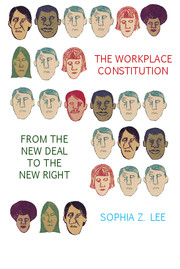Book contents
- Frontmatter
- Contents
- Acknowledgments
- Introduction
- Part I Crafting the Workplace Constitution in the New Deal 1930s and 1940s
- 1 Liberals Forge a Workplace Constitution in the Courts
- 2 Agencies Discover the Liberal Workplace Constitution
- 3 Conservatives Create a Workplace Constitution in the Courts
- Part II Advancing the Workplace Constitution in the Cold War 1950s
- Part III Administering the Liberal Workplace Constitution in the Long 1960s
- Part IV The Workplace Constitution in the New Right 1970s and 1980s
- Epilogue
- Appendix: Figures
- Notes
- Selected Bibliography of Primary Sources
- Index
1 - Liberals Forge a Workplace Constitution in the Courts
Published online by Cambridge University Press: 05 October 2014
- Frontmatter
- Contents
- Acknowledgments
- Introduction
- Part I Crafting the Workplace Constitution in the New Deal 1930s and 1940s
- 1 Liberals Forge a Workplace Constitution in the Courts
- 2 Agencies Discover the Liberal Workplace Constitution
- 3 Conservatives Create a Workplace Constitution in the Courts
- Part II Advancing the Workplace Constitution in the Cold War 1950s
- Part III Administering the Liberal Workplace Constitution in the Long 1960s
- Part IV The Workplace Constitution in the New Right 1970s and 1980s
- Epilogue
- Appendix: Figures
- Notes
- Selected Bibliography of Primary Sources
- Index
Summary
“We were not antagonistic to collective bargaining.”
Charles Hamilton HoustonOn July 5, 1939, a solemn C. W. Rice took the floor before the House Committee on Labor. “Having organizations which do not allow persons of color to belong to them, representing the colored people, is not due process of law and is illegal,” Rice insisted. Those gathered before him had just returned from celebrating the nation’s Declaration of Independence. Rice’s message resonated with a core precept of that document, as well as of the Constitution to which it led: that a government in which the people had no representation was tyrannical. Rice was not testifying about political government, however. Instead, he spoke of the labor unions newly empowered by the 1935 National Labor Relations Act (NLRA). Along with the similar 1934 Railway Labor Act, the NLRA had transformed the relationships among workers, unions, and employers, for the first time giving workers a right to unionize, and legally requiring an employer to bargain with the union its workers chose.
Rice favored unionization but criticized the new labor laws. “Exclusive representation” was a cornerstone of both. Once a union demonstrated that it was supported by a majority of the workers it sought to represent, these laws gave the union the right to represent all of those workers, prohibiting the employer from contracting with its workers directly or with any other unions claiming their support. Proponents contended that exclusive representation was needed to prevent employers from fomenting company unions to undercut the very right to organize that the laws were intended to secure. Rice countered that it gave unions the right to represent black workers whom they excluded from membership and to whom they had long been hostile. He urged Congress to amend the NLRA to prohibit racially discriminatory unions from serving as the exclusive representative for black workers.
- Type
- Chapter
- Information
- Publisher: Cambridge University PressPrint publication year: 2014



